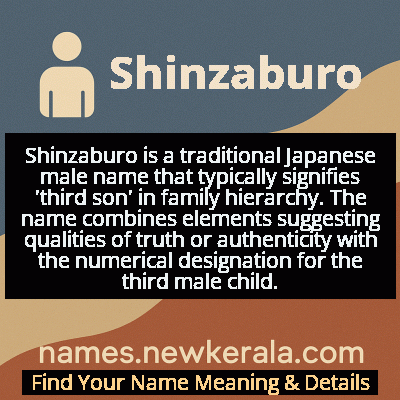Shinzaburo Name Meaning & Details
Origin, Popularity, Numerology Analysis & Name Meaning of Shinzaburo
Discover the origin, meaning, and cultural significance of the name SHINZABURO. Delve into its historical roots and explore the lasting impact it has had on communities and traditions.
Name
Shinzaburo
Gender
Male
Origin
Japanese
Lucky Number
7
Meaning of the Name - Shinzaburo
Shinzaburo is a traditional Japanese male name that typically signifies 'third son' in family hierarchy. The name combines elements suggesting qualities of truth or authenticity with the numerical designation for the third male child.
Shinzaburo - Complete Numerology Analysis
Your Numerology Number
Based on Pythagorean Numerology System
Ruling Planet
Neptune (Ketu)
Positive Nature
Intuitive, analytical, spiritual, and inquisitive.
Negative Traits
Secretive, reserved, aloof, and can be overly critical.
Lucky Colours
Green, yellow.
Lucky Days
Monday.
Lucky Stones
Cat’s eye, moonstone.
Harmony Numbers
1, 5, 6.
Best Suited Professions
Scientists, researchers, spiritual leaders, detectives.
What People Like About You
Depth of knowledge, analytical skills, spirituality.
Famous People Named Shinzaburo
Shinzaburo Takeda
Artist and Printmaker
Renowned Japanese woodblock print artist known for his vibrant depictions of Mexican culture and social themes
Shinzaburo Matsuo
Business Executive
Former president of Matsuo Shoten and influential figure in Japanese traditional crafts industry
Shinzaburo Furukawa
Educator and Scholar
Pioneering educator who established several schools and promoted Western learning in early 20th century Japan
Name Variations & International Equivalents
Click on blue names to explore their detailed meanings. Gray names with will be available soon.
Cultural & Historical Significance
The 'shin' character (真 or 新) in the name often signifies qualities like truth, authenticity, or newness, reflecting the cultural values placed on sincerity and innovation. In traditional Japanese society, third sons like those named Shinzaburo often pursued diverse paths including business, arts, or scholarship rather than inheriting family responsibilities, giving the name associations with creativity and non-conformity. The name's usage declined post-World War II as Western naming conventions gained popularity, but it remains a respected choice for families valuing cultural heritage.
Extended Personality Analysis
Individuals named Shinzaburo are often perceived as possessing a blend of traditional values and innovative thinking. The 'shin' element suggests qualities of authenticity and truth-seeking, while the 'zaburo' suffix indicates a position as a third child, traditionally associated with adaptability and resourcefulness. This combination typically results in someone who respects established customs but isn't afraid to explore new approaches, making them balanced individuals who can bridge generational and cultural gaps.
In social contexts, Shinzaburos are often seen as reliable yet creative, with a strong sense of personal integrity. They tend to be observant and thoughtful, preferring to analyze situations before acting. The historical context of third sons pursuing diverse careers rather than family obligations may contribute to an independent streak and entrepreneurial spirit. While they value harmony in relationships, they also possess the courage to stand by their convictions, making them respected figures in both professional and personal circles.
Modern Usage & Popularity
In contemporary Japan, Shinzaburo is considered a somewhat rare and traditional name, primarily chosen by families with strong connections to Japanese heritage or those seeking distinctive names with historical significance. While it peaked in popularity during the late Meiji and early Showa periods, its usage has declined significantly since the 1960s as parents increasingly favor more modern or Western-sounding names. However, there's been a minor resurgence among families interested in preserving cultural traditions, particularly in rural areas and among families with samurai or merchant lineage. The name is now more commonly encountered among middle-aged and elderly men rather than newborns, reflecting its status as a classic rather than contemporary choice.
Symbolic & Spiritual Meanings
Symbolically, Shinzaburo represents the balance between tradition and progress, with the 'shin' character often interpreted as representing truth, authenticity, or new beginnings, while the numerical 'zaburo' component symbolizes order, family structure, and cultural continuity. The name carries metaphorical weight as a bridge between generations, embodying the Japanese concept of 'wa' (harmony) through its combination of established naming conventions with individual character significance. In a broader sense, it symbolizes the third son's historical role as an innovator and explorer within family systems, often venturing beyond traditional paths to create new opportunities while maintaining cultural roots and values.

